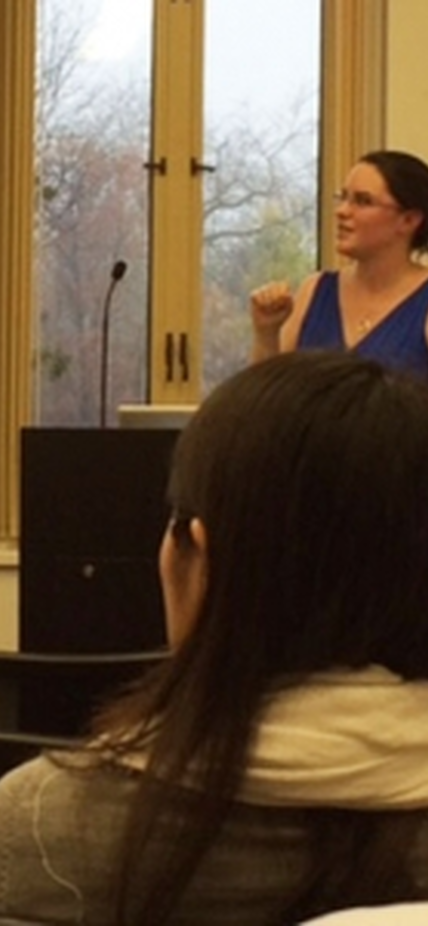Caitlin Murphy, a 2012-2014 Geophysical Laboratory Postdoctoral Fellow who received her Ph.D. from Caltech, presented a talk about her experience as an AIP-ASA Congressional Science Fellow in the United States Senate.
Murphy, a recipient of AGU's 2013 Mineral and Rock Physics (MRP) Graduate Research Award, is an early-career scientist with broad interests and strong data analysis, organizational, and communication skills. Her background is in both Earth Science and Materials Science, and she has extensive experience in high-pressure techniques, synchrotron and neutron scattering experiments, and innovative data analysis strategies. Her passion for communicating science to diverse audiences, increasing diversity in STEM fields, and the relationship between scientific research and policy decisions led her to apply for a Congressional Science Fellowship.
At the end of Murphy's Carnegie fellowship, she questioned whether or not academic research was for her. She asked herself what she enjoyed about academia/research/science, and what she could live without. After weighing her love of quantitative measurements, teaching, communicating, and mentoring against the isolation of working alone in a lab on a narrow research topic, she decided to branch out and joined the 2014-2015 class of AAAS Science & Technology Policy Fellows.
Murphy presented a summary of the 3 branches of the U.S. government: Legislative, Executive, and Judicial, each vying for their own agendas to be passed. The role of the Science & Technology Fellows is crucial in the fight for science. Her training as a scientist equipped her with relevant skills, such as:
- critical thinking
- self motivation
- logical/methodical approaches to problems
- need for proof
- literature review
- data analysis
- numbers
- processing/communicating
Murphy's science policy fellowship included working on Climate Change policy, the Keystone XL pipeline, and a broad energy bill that was crafted by the Senate Energy Committee. These experiences allowed her to help shape the discussion about how to advance a progressive, clean energy policy, which sends important market signals to the innovators, manufacturers, and distributors of clean energy technologies.
The fellowship also gave her the unique opportunity to interact with many elected officials and public servants, such as the Secretary of Energy, the Director of ARPA-E, and the Director of Argonne National Lab, to name a few. Finally, it helped her to develop several skills that are relevant both within and outside academia:
- negotiation
- compromise
- fast-paced working
- multitasking
- how to communicate with non-scientists
- how the federal government works
Following her year as a Congressional Science Fellow in the office of Senator Al Franken, she is now transitioning to the Department of Energy (DOE) as an AAAS Science & Technology Policy Fellow in the Office of Energy Policy & Systems Analysis. There, she will collaborate with DOE National Labs and the private sector on a wide range of policy areas related to climate change, the environment, and energy efficiency.
Murphy suggested that those who are interested should think about applying for a AAAS Science & Technology Policy fellowship before moving on to a permanent academic position. Her Powerpoint presentation is attached.
